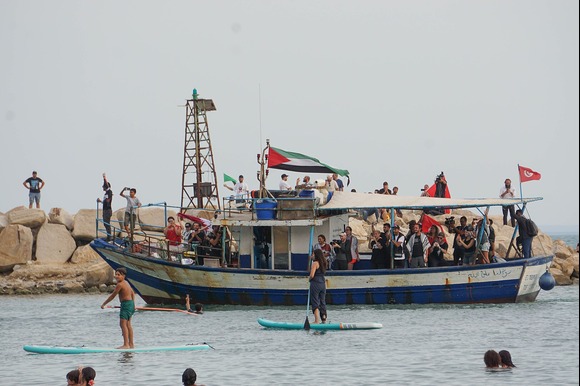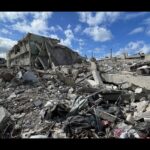The Israeli Navy has intercepted and seized a flotilla of ships carrying humanitarian aid to Gaza, a move that has sparked international condemnation and reignited debate over Israel’s blockade of the coastal enclave.
The flotilla, consisting of several vessels carrying medical supplies, food, and other essential goods, was organized by a coalition of international NGOs and pro-Palestinian activists. Its stated goal was to deliver urgently needed humanitarian assistance to Gaza, where shortages of medicine, electricity, and clean water have reached critical levels.
Israel’s military confirmed the operation, stating that naval forces intercepted the flotilla in the Mediterranean before it could enter Gaza’s territorial waters. According to officials, the ships were escorted to the Israeli port of Ashdod, where their cargo was scheduled for inspection.
Israeli Authorities Defend the Blockade
A spokesperson for the Israel Defense Forces (IDF) defended the interception, saying the blockade was a matter of national security.
“The naval blockade is a legal and necessary measure to prevent weapons smuggling into Gaza,” the spokesperson said. “All humanitarian aid is redirected through official channels to ensure it does not end up in the hands of terrorist organizations such as Hamas.”
Israel has enforced a strict naval blockade on Gaza since 2007, when Hamas took control of the territory. While Israel allows aid to pass through its border crossings under supervision, activists argue that the blockade prevents sufficient humanitarian relief from reaching civilians.
Flotilla Organizers Condemn Israeli Action
The flotilla’s organizers strongly condemned the interception, accusing Israel of violating international law and denying basic human rights.
“Our mission was purely humanitarian,” said one activist spokesperson aboard the ships. “Stopping medical aid and food from reaching suffering families in Gaza is inhumane and unacceptable.”
Some of the activists also reported tense moments during the naval interception, although no casualties were confirmed at the time of reporting.
Global Reactions to the Interception
The incident has drawn swift responses from governments and human rights organizations worldwide.
- Turkey, which has supported past flotilla missions, demanded an explanation and called the interception “a grave violation of international humanitarian principles.”
- The European Union urged Israel to allow unhindered delivery of aid to Gaza and emphasized the need for restraint from all parties.
- The United Nations expressed concern and announced that the Security Council may convene an emergency session to address the incident.
Several international humanitarian groups also criticized the move, describing it as an escalation that worsens the plight of Gaza’s 2.3 million residents.
Humanitarian Crisis in Gaza
The humanitarian situation in Gaza remains one of the most pressing concerns for the international community. The United Nations has repeatedly warned that Gaza faces severe shortages of essential goods, with hospitals lacking critical medicines and the majority of households receiving only a few hours of electricity each day.
Water scarcity, high unemployment, and food insecurity have added to the suffering, making aid flotillas a symbolic as well as practical lifeline for many residents.
Historical Context: The Mavi Marmara Incident
This interception immediately drew comparisons to the 2010 Mavi Marmara raid, in which Israeli commandos stormed a Turkish ship attempting to deliver aid to Gaza. The confrontation turned deadly, with 10 activists killed, leading to a major diplomatic fallout between Israel and Turkey.
Although this latest incident did not result in fatalities, it highlights the ongoing tension surrounding attempts to break the blockade and the political consequences that follow.
Calls for Lifting the Blockade
Human rights groups, including Amnesty International and Human Rights Watch, have long described the blockade as a form of “collective punishment” against Gaza’s civilian population. They argue that while Israel cites security concerns, the blockade disproportionately harms ordinary people rather than armed groups.
Meanwhile, Israel insists that the restrictions are vital for its security and has accused Hamas of diverting aid and materials for military purposes, including tunnel construction and rocket manufacturing.
Looking Ahead
As international pressure builds, questions remain about how Israel will handle the aid seized from the flotilla. Officials have suggested the cargo may be inspected and then transferred to Gaza through authorized border crossings, though activists remain skeptical about whether the aid will reach its intended recipients.
The latest confrontation underscores the broader dilemma facing the region: how to balance Israel’s security concerns with the urgent humanitarian needs of Gaza’s population. With tensions rising, the episode is likely to intensify diplomatic efforts, protests, and debates on the international stage in the days ahead.






